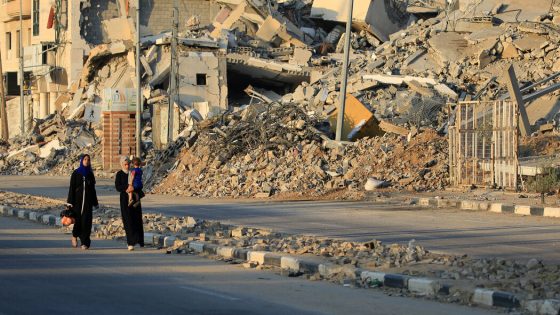On Oct. 7, as the Hamas-led attack on Israel was unfolding, many Palestinians took to the streets of Gaza to celebrate what they likened to a prison break and saw as the sudden humiliation of an occupier.
But it was just a temporary boost for Hamas, whose support among Gazans has been low for some time. And as the Israeli onslaught has brought widespread devastation and tens of thousands of deaths, the group and its leaders have remained broadly unpopular in the enclave. More Gazans have even been willing to speak out against Hamas, risking retribution.
In interviews with nearly a dozen Gaza residents in recent months, a number of them said they held Hamas responsible for starting the war and helping to bring death and destruction upon them, even as they blame Israel first and foremost.
One Gazan, Raed al-Kelani, 47, said Hamas always acts in its own interests.
“It started Oct. 7, and it wants to end it on its own terms,” said Mr. al-Kelani, who worked as a civil servant for the former Palestinian Authority government in Gaza, which was run by a rival faction to Hamas before Hamas seized control of the territory in 2007.
“But time is ticking with no potential hope of ending this,” he added. Mr. al-Kelani now makes meals and distributes food aid in shelters for displaced Gazans. “Hamas is still seeking its slice of power,” he said. “Hamas does not know how to get down from the tree it climbed.”
Some of the Gazans who spoke to The New York Times said that Hamas knew it would be starting a devastating war with Israel that would cause heavy civilian casualties, but that it did not provide any food, water or shelter to help people survive it. Hamas leaders have said they wanted to ignite a permanent state of war with Israel on all fronts as a way to revive the Palestinian cause and knew that the Israeli response would be big.
Throughout the war, hints of dissent have broken through, sometimes even as Gazans were mourning loved ones killed by Israeli attacks. Others waited until they left the enclave to condemn Hamas — and even then were at times reluctant in case the group survives the war and continues to govern Gaza.
In March, the well-known Gaza photojournalist Motaz Azaiza caused a brief social media firestorm when he obliquely criticized Hamas after he left the territory. He was one of a handful of young local journalists who rose to international prominence early in the war for documenting the death and destruction on social media.
“If the death and hunger of their people do not make any difference to them,” he wrote in an apparent reference to Hamas, “they do not need to make any difference to us. Cursed be everyone who trafficked in our blood, burned our hearts and homes, and ruined our lives.”
Some Palestinians attacked him over the comments, and Mr. Azaiza felt compelled to defend himself publicly. But inside Gaza, many agreed that he was giving voice to a sentiment that had grown over the course of the war.
Gauging public opinion in Gaza was difficult even before the war began. For one, Hamas, which long controlled territory, perpetuated a culture of fear with its oppressive system of governance and exacted retribution against those who criticized it.
Now, polling has become even more difficult, with most of the 2.2 million Gazans displaced multiple times by the war, constant breakdowns in communications and constant Israeli military offensives.
Still, some recent surveys reflect the weak or mixed support in Gaza for Hamas and its leaders. In some cases, contradictory results underline the complications in surveying a transient population during the fog of war.
In March, a survey by the West Bank-based Institute for Social and Economic Progress asked Gazans how they felt about Hamas leaders. About three-quarters opposed Yahya Sinwar, the group’s Gaza-based leader, and a similar share opposed Ismail Haniyeh, the movement’s political leader in exile.
“When you realize six months in or seven months in that Gaza is completely destroyed, your life as a Gazan is completely destroyed, that’s where people are coming from when they are not supportive of Sinwar or Haniyeh,” said Obada Shtaya, a Palestinian and a founder of the Institute for Social and Economic Progress.
Other polls painted a more mixed picture. A poll conducted by the Palestinian Center for Policy and Survey Research in Gaza and published this past week showed that support in Gaza for Hamas leaders is slightly higher, and that the share who are satisfied with Hamas leadership in the territory has risen since December.
But it also showed that support for Hamas continuing to govern the territory had declined slightly in the past three months.
Basem Naim, a Hamas spokesman, said that public support for Hamas in Gaza was no less than 50 percent. That includes Hamas members in Gaza — which he said numbered more than 100,000 — and their families.
“Are there people in Gaza who blame Hamas? Of course,” he told The Times. “We aren’t saying that 100 percent of Gaza residents are Hamas supporters or are happy with what happened,” he added.
“In the end,” he said, “this is a natural thing in societies that some people are for and some people are against. And we welcome this position.”
Some of the nearly one dozen Gazans The Times spoke to about Hamas say this war has lasted longer than any previous conflict between Israel and an armed Palestinian faction in Gaza in part because Hamas seeks not only to survive, but to cling to power. And if it does, there is no guarantee that future wars with Israel will not plunge Gazans back into the same misery.
Hamas says it will not agree to any cease-fire deal with Israel that leads only to a temporary truce, wary that the war would restart once the Israeli hostages are freed. The group says it wants a permanent cease-fire.
Mr. Naim said that if Hamas had such low popularity numbers as a result of the war, then it should be left to elections that allow Palestinians to choose their representatives. But over the past decades, Palestinians in both Gaza and the Israeli-occupied West Bank have had few opportunities to express their voice in democratic elections.
The two territories are separated geographically, and while Hamas has governed Gaza for more than a decade, the more moderate Palestinian Authority administers some parts of the West Bank.
The Fatah party, a rival to Hamas, lost a legislative election to Hamas in 2006. The next year, Hamas fighters routed Fatah forces from Gaza and forcibly seized control of the territory. The political chasm between Hamas and Fatah has, in large part, hindered elections since then.
In 2021, Palestinian parliamentary elections were delayed indefinitely after Mahmoud Abbas of Fatah, the president of the Palestinian Authority, raised concerns about possible Israeli government constraints on the voting. However, there were also suggestions at the time that Mr. Abbas may have delayed because he was worried about Fatah losing ground.
Mr. Naim blamed Israel and the United States for disrupting past Palestinian elections.
One Gaza resident who in recent months fled to Egypt with her family said that she hears regularly from friends and family that they do not want the war to end before Hamas is defeated in Gaza. She said Hamas had prioritized its own aims over the well-being of the Palestinians they purport to defend and represent.
“They could have surrendered a long time ago and saved us from all this suffering,” said the woman, who asked not to be named for fear of possible retribution if her criticism were made public.
Even for Palestinians who chafed under Hamas’s iron grip on Gaza for more than a decade, Oct. 7 gave them a feeling, at least initially, that this was a battle of liberation from Israeli occupation. Much of Gaza’s population are either refugees or descendants of refugees who fled their homes in present-day Israel after they were expelled or forced to flee during the war surrounding the establishment of the Israeli state. They have never been allowed to return.
When Hamas attacked Israel, most Gazans supported that “form of resistance,” said a 26-year-old lawyer from Gaza who also asked not to be named.
“But what we don’t support is them continuing with this war when they have not accomplished any of the goals they set out to accomplish,” the lawyer said. “This isn’t resistance. This is insanity.”
Hamas’s stated goals for the attack touched mostly on broader Palestinian aspirations beyond Gaza’s borders. And some residents of the territory have long felt that during each new round of war between Hamas and Israel, the group is seeking to raise its global profile and champion more universal Palestinian causes at the expense of ordinary Gazans.
One of Hamas’s aims was to free Palestinian prisoners held by Israel, some of them from Gaza, but others from the West Bank and East Jerusalem. It also wanted to stop Israel from exerting increased control over Al Aqsa Mosque in the Old City of Jerusalem — one of Islam’s holiest sites — and to stop the expansion of Jewish settlements in the occupied West Bank.
The more that Hamas pushed those objectives rather than ending the war quickly, Gazans said they felt other Palestinians were winning their freedom at their expense.
“I do not want to sacrifice my life, my home and house for anyone,” Ameen Abed, a resident of Jabaliya in northern Gaza, said at the time of one of the prisoner releases.
“Who are you to impose this kind of life on me? My home has gone because someone’s imprisonment will end after four months, why?” he said. “What did I benefit from?”
While Hamas and even the Israeli hostages were in the underground tunnels, he said, Gazans were above ground with no protection from Israeli and U.S.-made bombs dropped over their heads every day. That is an oft-heard complaint by Hamas’s critics in Gaza.
“There is uncontrolled anger against Hamas,” he said. “It threw the Palestinian people into the bottom of the well.”
Source Agencies




